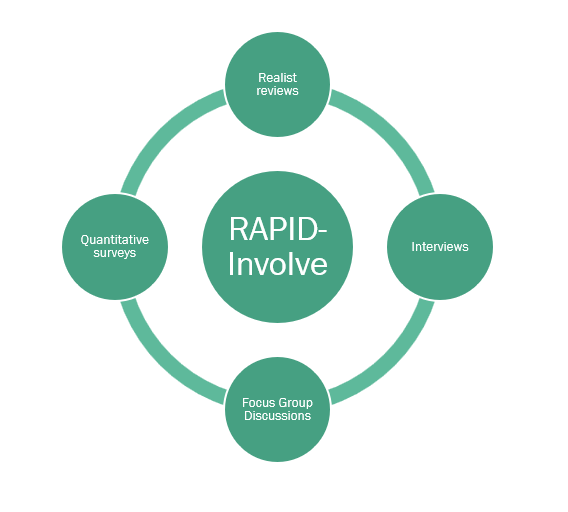RAPID-Involve: Supporting public involvement in rapid research settings
Funding partner | Medical Research Council
See our study listed on the MRC website here.
Project Overview
The RAPID-Involve study has been awarded by the UK Research and Innovation’s (UKRI) Medical Research Council (MRC) under the ‘Better Methods, Better Research’ award scheme to explore how best to support impactful and inclusive public involvement in rapid research.
Why this matters
Rapid research studies, which usually takes place in less than six months, are often essential in informing health and care policies and practices. Such studies are also considered advantageous in being less time-, cost-, and resource-consuming. Their topics can be complex and involve Welsh Government, the NHS and social care. However, one of their foremost issues includes potential poor patient and public involvement due to poor representation of certain groups in the studies. Inclusive public involvement in research is crucial to ensure diverse views influence decision making that supports health and wellbeing for all. This omission can limit the influence of these groups on decision-making, potentially widening health inequalities which are often disproportionality experienced by underserved communities. This challenge implies the possible reduction of both the reliability of the rapid research findings and the effectiveness of the subsequent health and care policy.
RAPID-Involve therefore looks to develop practical and inclusive resources to support research teams in involving the public, especially the under-represented communities.

Our Aim
To understand the best ways to support public involvement and capture their impact in rapid research settings.
Objectives
- Understanding the opportunities for involvement and impact during rapid evidence.
- Identifying and refining the already available toolkit/s (such as PIRIT for example) so that it/they are suitable for use in rapid evidence research.
- Identify novel and more inclusive ways to support underserved individuals to become involved in and to report impact and add these as complementary resources in the Toolkit developed.
Our Approach
Mixed methods for each objective.

Timeline | June 2025 to September 2027
Research Team and Partners
Dr Natalie Joseph-Williams | Project Lead | Cardiff University
Dr Denitza Williams | Project Co-lead | Cardiff University
Libby Humphris | Lead Public Partner
Prof Dawn Mannay | Work Package Co-lead | Cardiff University
Sarah Peddle | Work Package Co-lead / Public Partner
Dr Ruth Lewis | Work Package Co-lead | Bangor University
Professor Adrian Edwards | Co-applicant | Cardiff University
Mala Mann | Co-applicant | Cardiff University
Dr Elly Clarke | Research Associate | Cardiff University
Dr Ifunanya Anyanwu | Research Assistant | Cardiff University
Peter Gee | Project Partner | Health and Care Research Wales
Kate Boddy | Project Partner | NIHR ARC South-West Peninsula
Contact Us
Rapidinvolve@cardiff.ac.uk

